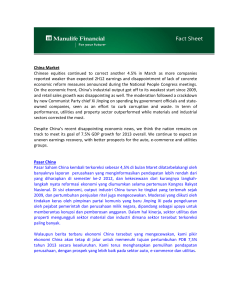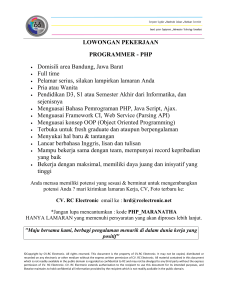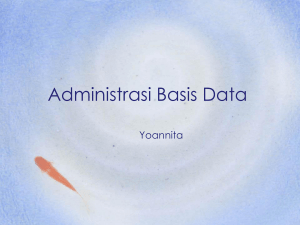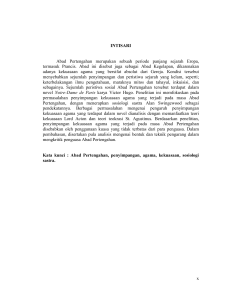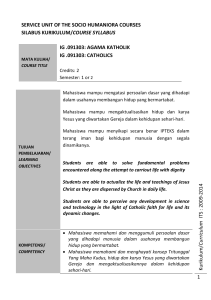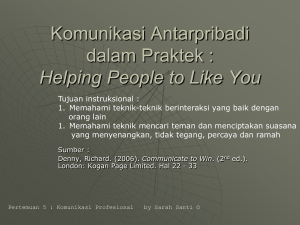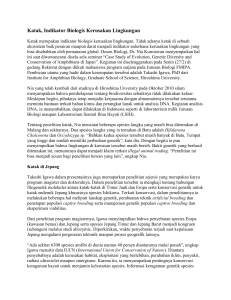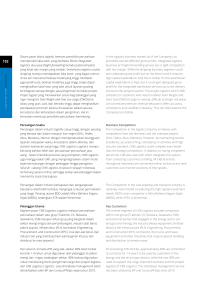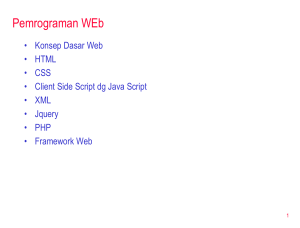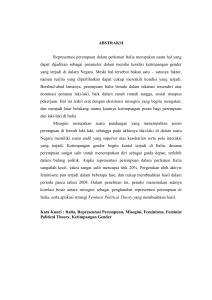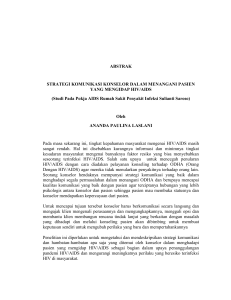Abstrak: Vol. 15, No. 1, April 2016
advertisement
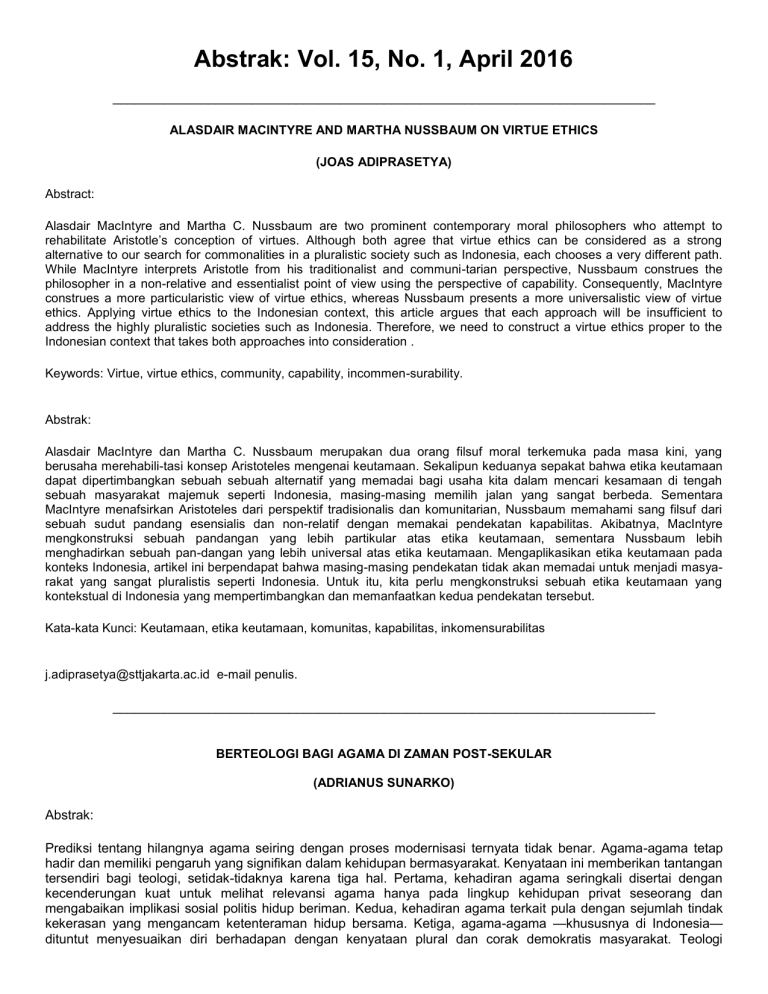
Abstrak: Vol. 15, No. 1, April 2016 __________________________________________________________________________ ALASDAIR MACINTYRE AND MARTHA NUSSBAUM ON VIRTUE ETHICS (JOAS ADIPRASETYA) Abstract: Alasdair MacIntyre and Martha C. Nussbaum are two prominent contemporary moral philosophers who attempt to rehabilitate Aristotle’s conception of virtues. Although both agree that virtue ethics can be considered as a strong alternative to our search for commonalities in a pluralistic society such as Indonesia, each chooses a very different path. While MacIntyre interprets Aristotle from his traditionalist and communi-tarian perspective, Nussbaum construes the philosopher in a non-relative and essentialist point of view using the perspective of capability. Consequently, MacIntyre construes a more particularistic view of virtue ethics, whereas Nussbaum presents a more universalistic view of virtue ethics. Applying virtue ethics to the Indonesian context, this article argues that each approach will be insufficient to address the highly pluralistic societies such as Indonesia. Therefore, we need to construct a virtue ethics proper to the Indonesian context that takes both approaches into consideration . Keywords: Virtue, virtue ethics, community, capability, incommen-surability. Abstrak: Alasdair MacIntyre dan Martha C. Nussbaum merupakan dua orang filsuf moral terkemuka pada masa kini, yang berusaha merehabili-tasi konsep Aristoteles mengenai keutamaan. Sekalipun keduanya sepakat bahwa etika keutamaan dapat dipertimbangkan sebuah sebuah alternatif yang memadai bagi usaha kita dalam mencari kesamaan di tengah sebuah masyarakat majemuk seperti Indonesia, masing-masing memilih jalan yang sangat berbeda. Sementara MacIntyre menafsirkan Aristoteles dari perspektif tradisionalis dan komunitarian, Nussbaum memahami sang filsuf dari sebuah sudut pandang esensialis dan non-relatif dengan memakai pendekatan kapabilitas. Akibatnya, MacIntyre mengkonstruksi sebuah pandangan yang lebih partikular atas etika keutamaan, sementara Nussbaum lebih menghadirkan sebuah pan-dangan yang lebih universal atas etika keutamaan. Mengaplikasikan etika keutamaan pada konteks Indonesia, artikel ini berpendapat bahwa masing-masing pendekatan tidak akan memadai untuk menjadi masyarakat yang sangat pluralistis seperti Indonesia. Untuk itu, kita perlu mengkonstruksi sebuah etika keutamaan yang kontekstual di Indonesia yang mempertimbangkan dan memanfaatkan kedua pendekatan tersebut. Kata-kata Kunci: Keutamaan, etika keutamaan, komunitas, kapabilitas, inkomensurabilitas [email protected] e-mail penulis. __________________________________________________________________________ BERTEOLOGI BAGI AGAMA DI ZAMAN POST-SEKULAR (ADRIANUS SUNARKO) Abstrak: Prediksi tentang hilangnya agama seiring dengan proses modernisasi ternyata tidak benar. Agama-agama tetap hadir dan memiliki pengaruh yang signifikan dalam kehidupan bermasyarakat. Kenyataan ini memberikan tantangan tersendiri bagi teologi, setidak-tidaknya karena tiga hal. Pertama, kehadiran agama seringkali disertai dengan kecenderungan kuat untuk melihat relevansi agama hanya pada lingkup kehidupan privat seseorang dan mengabaikan implikasi sosial politis hidup beriman. Kedua, kehadiran agama terkait pula dengan sejumlah tindak kekerasan yang mengancam ketenteraman hidup bersama. Ketiga, agama-agama —khususnya di Indonesia— dituntut menyesuaikan diri berhadapan dengan kenyataan plural dan corak demokratis masyarakat. Teologi ditantang untuk menyumbangkan refleksi yang berguna bagi terbentuknya agama yang tidak lupa akan implikasi sosial-politiknya, yang bebas dari kekerasan dan mampu menempatkan diri dengan tepat di tengah masyarakat demokratis dan plural. Kata-kata Kunci: Post-sekular, privatisasi agama, kekerasan, multi-kultural, posisi epistemis, demokrasi, teologi politik. Abstract: The prediction that religion would vanish during and because of the modernization is not really true. Religions are still present and play a significant role in social life. This fact gives a special and interesting challenge to theology, at least for three reasons. First, the presence of religion is often accompanied by the strong tendency among its adherents to find the relevance of religion only to the one’s private life, denying the social and political implication of religion. Second, the presence of religion is connected with the acts of violence, which threaten the peace of the social life. Third, the religions —especially in Indonesia— have to adapt themselves to the pluralistic reality and the democratic system of the society. Theology is challenged to offer meaningful reflection on the formation of religion, which does not forfeit its social and political implications, free from violence and mindful of how to place itself properly in the democratic and pluralistic society. Keywords: Post-secular, privatization of religion, violence, multi-cultural, epistemic position, democracy, political theology. [email protected]. e-mail penulis __________________________________________________________________________ DOKTRIN TRINITAS DALAM DISKURSUS TEOLOGI EKONOMIK (YAHYA WIJAYA) Abstrak: Artikel ini menguraikan penggunaan konsep teologis “Trinitas sosial” oleh empat teolog yang secara khusus menyoroti isu-isu ekonomi. Secara umum para teolog itu menyatakan bahwa teologi ekonomik yang berdasarkan “Trinitas sosial” menolak model ekonomi individualistik yang memertaruhkan komunitas. Mereka memberi gambaran yang berbeda-beda tentang model ekonomi yang layak ditolak itu. Meeks dan Boff melihat praktik ekonomi pasar yang berlaku saat ini maupun praktik ekonomi sosialis yang pernah dijalankan di negara-negara komunis sebagai wujud-wujud dari model ekonomi semacam itu. Novak menolak praktik sosialisme dan memandang kapitalisme yang bersifat demokratik sebagai model ekonomi yang trinitaris. Higginson menilai model ekonomi yang individualistik itu tersirat dalam “etos Protestan”nya Max Weber dan seringkali tercermin dalam cara pengelolaan perusahaan. Saya melanjutkan teologi ekonomik yang berdasarkan Trinitas Sosial itu dengan menjadikan secara spesifik keluarga sebagai wujud konkret komunitas. Saya berpendapat bahwa “Trinitas keluarga” dapat menjadi dasar bagi pengembangan teologi ekonomik yang responsif terhadap konteks ekonomi Indonesia dan Asia pada umumnya, di mana keluarga menjadi bukan hanya model hubungan sosial tetapi juga acuan etis. Kata-kata kunci: Trinitas sosial, teologi ekonomik, ekonomi ke-keluargaan. Abstract: This article explores the use of the theological concept of “social Trinity” by four theologians focusing on economic issues. In general, those theologians suggest that the concept of “social Trinity” implies an economic theology resisting the individualistic economy model, which puts the community at stake. They disagree on which economc system exactly they consider worth rejecting. For Meeks and Boff, that economic model includes both the existing market economy and socialism as had been practised in the communist countries. Novak rejects the economic system of socialist countries whilst insisting that “democratic capitalism” is consistently trinitarian. Higginson argues that the individualistic economy is implied in Weber’s “Protestant ethic” and often reflected in the management of corporations. Subscribing to the economic theology based on “social Trinity,” and, at the same time, responding specifically to the characteristics of the Indonesian context, I suggest the family as a concrete form of community. I argue that “familial Trinity” would serve as a foundation for developing an economic theology in response to the situation of Indonesian economy and Asian economy in general, where the family is not only a model of social relations, but also an ethical reference. Keywords: Social Trinity, economic theology, familial economy. [email protected] e-mail penulis. __________________________________________________________________________ STATUS TUHAN DALAM FILSAFAT TEORETIS IMMANUEL KANT (MARTINUS ARIYA SETA) Abstrak: Di dalam filsafat teoretis Kant, status Tuhan bukan lagi transen-den tetapi transendental. Perubahan status Tuhan menjadi transendental memiliki dampak ganda. Di satu sisi, Kant memberikan pendasaran rasionalitas konsep Tuhan. Akan tetapi di sisi lain, Kant menghindari penegasan terhadap eksistensi Tuhan. Menurut Kant, konsep Tuhan adalah sebuah ide regulatif. Ide regulatif tidak memiliki referensi di luar pikiran manusia. Kant hanya menegaskan urgensi logis konsep Tuhan bagi kesatuan pengetahuan. Akan tetapi, urgensi logis tidak cukup memadai sebagai argumen pembuktian eksistensi Tuhan. Kant memisah-kan antara keternalaran dan ada. Pemisahan ini terlihat jelas di dalam kritik Kant terhadap pembuktian ontologis. Menurut penulis, profil filsafat transendental menjadi transparan di dalam kritik Kant terhadap pembuktian ontologis. Pengadopsian secara parsial paham dasar rasio-nalisme dan empirisme melatarbelakangi filsafat transendental dan me-micu pemisahan antara keternalaran dan ada yang tampak jelas di dalam kritik Kant terhadap pembuktian ontologis. Kata-kata kunci: Konsep, transendental, keternalaran, ada, ide regulatif, pembuktian ontologis Abstract: In Kant’s theoretical philosophy, the status of God is not transcendent anymore, but transcendental. The transcendental status of God has a double impact. On the one hand, the concept of God is conceivable. But on the other hand, Kant avoids the affirmation of the existence of God. The conceivability of God is not an argument for God’s existence because the concept of God is a regulative idea. A regulative idea has no reference outside the mind. Kant only affirms the logical necessity of the concept of God. However, the logical necessity is not an adequate argument for the existence of God. Kant separates between conceivability and being. The separation is obvious in his critique toward the ontological argument. In my opinion, the profile of the transcendental philosophy is transparent in Kant’s critique toward the ontological argument. The partial adoption of empirical and rational principles works behind the transcendental philosophy and leads to the separation between conceivability and being, which is visible in the Kant’s critique toward the ontological argument. Keywords: Concept, transcendental, conceivability, being, regulative idea, ontological argument. [email protected] e-mail penulis.
